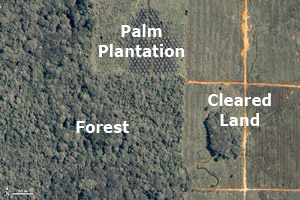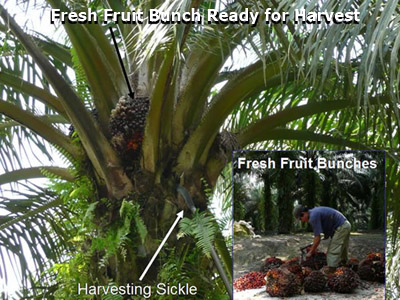The opening chapter of the book, Compression, could only reference a few reasons why Compression appears necessary. The main objective, of course, is to drastically reduce consumption of resources. Almost any problem of the 21st century can be alleviated by simply processing and consuming less stuff. But why?
The case for Compression is hard to understand mostly because our 20th century economic systems reinforce our natural inclinations to keep using more and more stuff: the idea that expanding business brings us a better life. Besides it’s the basis of many of our status systems.
Recently The Economist had a couple of easily understood articles that summarize a couple situations that were too much to include in the book Compression. The first article was on palm oil.
Seems that Greenpeace and other protest groups have intensified
 campaigns against the expansion of palm oil plantations. Tears up a lot of forest, and the planting areas have been expanding. Palm oil is used in many food products, and it has a much better per acre yield than other crops grown to make biofuels, one reason why export tonnage of palm oil has increased about 3X in the past 15 years. The energy yield is better than most other plants, so it makes sense to use it, but when grown in huge volumes, whether the carbon footprint is vastly smaller than that of fossil fuels is being questioned. But you can read the summary for yourself.
campaigns against the expansion of palm oil plantations. Tears up a lot of forest, and the planting areas have been expanding. Palm oil is used in many food products, and it has a much better per acre yield than other crops grown to make biofuels, one reason why export tonnage of palm oil has increased about 3X in the past 15 years. The energy yield is better than most other plants, so it makes sense to use it, but when grown in huge volumes, whether the carbon footprint is vastly smaller than that of fossil fuels is being questioned. But you can read the summary for yourself.
The other article is on threatened overfishing of blue fin tuna, alluded to in an earlier update. Most of the concern has been about overfishing in the Mediterranean. Most tuna in the Gulf of Mexico are yellowfin, and blue fin tuna fishing has been banned or restricted in the Gulf for 20 years or more. Almost none of the global blue fin catch is from U.S. waters. But the spring spawning ground preferred by the blue fin tuna happens to be the area impacted by the oil well blowout. If anyone knows what’s happened to the hapless tuna there, they have not reported yet.
These are just two more little chunks of evidence in an overall case to manage what we have much more carefully and simply use less of it. Much of the reason that economic expansion continues is that the assumptions underlying it remain hidden to us.

